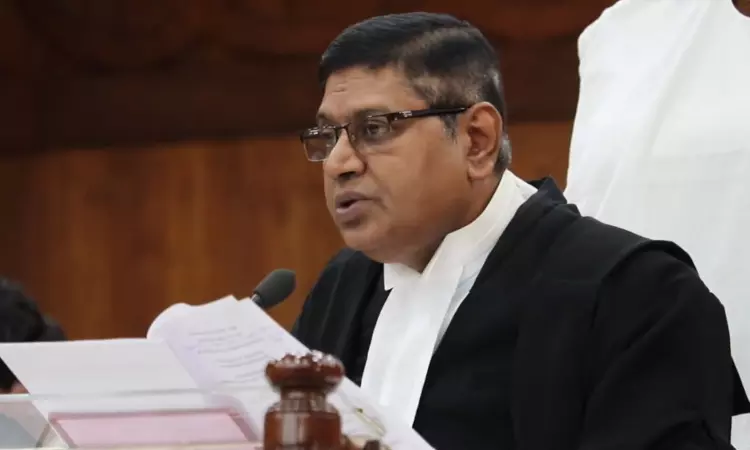Kerala Govt Decision To Appoint Justice Manikumar As SHRC Chairperson Raises Questions
Manu Sebastian
9 Aug 2023 1:21 PM IST

The Kerala Government’s decision to appoint Justice S Manikumar as the Chairperson of the State Human Rights Commission within a few months of his retirement as the Chief Justice of the Kerala High Court raises questions.
Post-retirement appointments, which take place soon after retirement, cast a cloud on the perception of judicial independence. Justice Manikumar had a fairly long stint as the Chief Justice of the Kerala High Court from October 11, 2019 till April 23, 2023. In April, a ‘secret’ farewell dinner arranged by the State Government for the Chief Justice at a beach resort in Kerala had created a controversy, as it was an unprecedented move. Rumours were rife since then that Justice Manikumar will be chosen as the next SHRC Chairperson. Leader of Opposition and Congress leader VD Satheesan objected to the Government’s decision saying, “Going by all that he did while serving as the Chief Justice of the Kerala High Court, I have great concerns over whether he will be able to execute his duties in a just and impartial manner". Former Leader of Opposition Ramesh Chennithala, who also criticised the Government's decision, alleged that the Justice Manikumar delayed crucial cases related to Sprinklr, Bevco app and brewery scam and said that the Government was returning a favour.
Any discussion on post-retirement appointments will be incomplete without a reference to the famous statement made by late Arun Jaitley in 2012 that “pre-retirement judgments are influenced by post-retirement jobs”. This is not to suggest that the decisions of Justice Manikumar were influenced by such offers. During his term, he has handled several politically sensitive cases, in which he has both ruled against and in favor of the State Government. However, the issue here is about public perception of independence. Immediate post-retirement appointments of the judges create a cloud over the sanctity of their judgments, irrespective of their merits. As it is well settled, the actual existence of bias is not required to vitiate the sanctity of judicial process; the perception of bias, founded on grounds which are not too far-fetched and hypothetical, taints judicial process. The judicially accepted test of bias is the reasonable likelihood of bias and not the actual existence of bias. The significance of the oft-quoted adage 'justice should not only be done but also seem to be done' gets more profound in this context.
After the 2019 amendment to the Protection of Human Rights Act 1993, it is not necessary that the Chairperson of the SHRC should have been a Chief Justice of a High Court previously. Any retired High Court judge is qualified to be appointed as SHRC Chairperson. Therefore, the State Government should explain why they have chosen Justice Manikumar without considering any other former High Court judges.
This situation also highlights the importance of the suggestion of a ‘cooling-off period’ for post-retirement appointments, as suggested by Arun Jaitley and former judges Justices SH Kapadia, RM Lodha and TS Thakur. "My suggestion is that for two years after retirement, there should be a gap (before the appointment), because otherwise, the government can directly or indirectly influence the courts and the dream to have an independent, impartial and fair judiciary in the country would never actualise," Jaitley had said. Justice S H Kapadia and Justice TS Thakur had suggested that no judge should accept any salaried job under any government at least for a cooling period of 3 years from his or her retirement.
In this context, relevant are some observations made by Justice Deepak Gupta in Rojer Mathew case. :
"If the administration makes appointments and judges, serving or newly retired judges, are under consideration for such posts then the independence of the judiciary is likely to be compromised. The public of this country still reposes great faith in the judiciary. That faith will be eroded in case it is felt that the appointments are made for extraneous reasons. Most judges live up to the expectations of the high standards of integrity and propriety expected from them but we cannot shut our eyes to the harsh reality that there are a few black sheep. One cannot expect justice from those who, on the verge of retirement, throng the corridors of power looking for post retiral sinecures".
It is also pertinent to refer to an observation made by the Supreme Court in Shanthi Bhushan vs Supreme Court of India:
"The faith of the people is the bed-rock on which the edifice of judicial review and efficacy of the adjudication are founded. Erosion of credibility of the judiciary, in the public mind, for whatever reasons, is greatest threat to the independence of the judiciary".
Justice Manikumar accepting the post will put his judicial actions under a cloud of suspicion, affecting public confidence in the judiciary. It is hoped that he will decline this offer and uphold high standards of judicial propriety.


